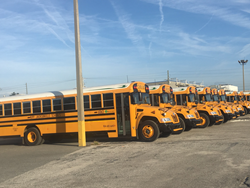KIPP Jacksonville Schools has converted to propane – the first U.S. charter school to do so. The 100 percent propane fueled school bus fleet will be used to transport students to and from campus. The 14 Blue Bird Vision Propane buses will reduce the fleet’s carbon footprint; the buses emit 80 percent less smog-producing hydrocarbon and nearly eliminate particulate matter as compared to diesel fuel.

KIPP Jacksonville Schools deployed its first-ever fleet of school buses to transport students to and from the area campus. It’s the first 100-percent propane-fueled fleet for a U.S. charter school.
“As the size of our campus expanded along with the number of students, it was time to have our own means of transportation,” said Bobby Kennedy, founding transportation manager of KIPP Jacksonville Schools. “We consulted with our Blue Bird dealer, Florida Transportation Systems, on available options, and were impressed by the safe and clean-operating properties of propane-fueled buses.”
According to ROUSH CleanTech, who installed the fuel systems, the propane autogas fuel systems are Environmental Protection Agency and California Air Resources Board certified.
“When compared with other fuel types, propane naturally runs cleaner, making for a more pleasant ride for both KIPP Jacksonville Schools’ passengers and drivers,” said Brian Carney, executive director of school bus and customer support for ROUSH CleanTech, manufacturer of the buses’ propane fuel system. “It also has noticeably quieter operation and increased maintenance savings overall.”
Performance of the buses have not been compromised in any way, according to Kennedy, who said the Ford 6.8L V10 engines in the propane buses are responsive to acceleration. In addition, drivers have also said the engines are quite and the buses don’t heat excessively at their feet as compared to diesel buses.
Kennedy said using propane has enabled the school system to save money in both lower fuel prices as well as in less maintenance costs. Currently KIPP Jacksonville Schools pays nearly half the cost per gallon for propane as compared with the average cost for diesel. Kennedy also noted that going forward the school will continue to purchase propane-fueled buses.

